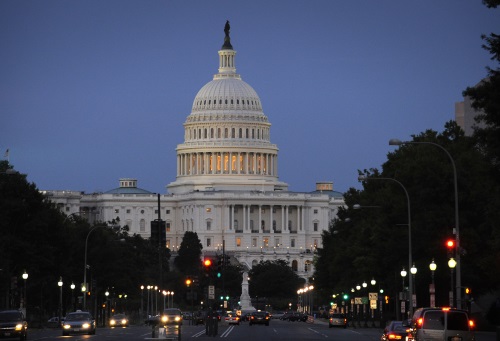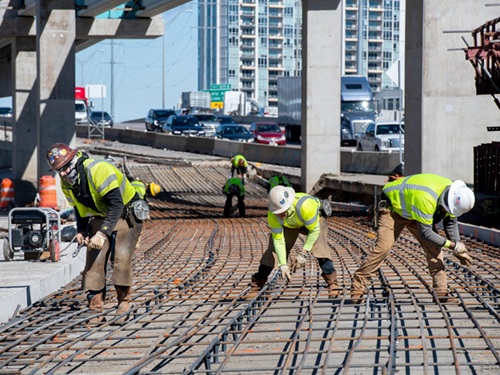A renewed call to repeal the impending $7.6 billion rescission of unobligated Federal-aid highway program contract authority, though it was not included within the successful Senate passage of a “minibus” appropriations bills this week, is one of the latest signs that transportation remains an acute concern for Congress – especially as the federal government is functioning under a continuing funding resolution that expires November 21.
The Senate minibus included the Transportation-Housing and Urban Development or THUD funding package with an amendment that heads off an automatic 12 percent across-the-board funding cut for public transit agencies.

“The entire federal government is now operating under a continuing resolution and in less than a month that continuing resolution will expire,” noted Sen. Richard Shelby, R-Ala., chairman of the Senate Committee on Appropriations, in a statement.
Congress passed legislation in July that suspended the federal debt ceiling and set government spending caps for the next two fiscal years, but the task of passing specific appropriations bills to disburse those monies remains incomplete, Sen. Shelby noted.
“The prospect of serial continuing resolutions – or worse, another government shutdown – casts a dark shadow over our previous success,” he stressed. “Such uncertainty also wreaks havoc on every federal agency’s ability to plan.”
Such concerns helped prompt Senate passage of a four-bill package of appropriations legislation – H.R. 3055 – on October 31 by a vote of 84 to 9, which included $86.6 billion in fiscal year 2020 funding for the U.S. Department of Transportation approved on September 19 by the Senate Appropriations Committee, which is $167 million above the FY 2019 enacted level. That topline number closely matches figures within the “minibus” funding package passed by the House of Representatives in June.

The Senate also passed a bipartisan amendment proffered by Sen. McSally, R-Ariz., and Sen. Doug Jones, D-Ala., by a vote of 82 to 11 that would block an automatic 12 percent public transit due to a budget control mechanism called the “Rostenkowski Test,” which is intended to ensure incurred financial obligations associated with transit contract authority from the Highway Trust Fund does not get too far ahead of anticipated tax collections.
The American Association of State Highway and Transportation Officials joined 30 other organizations in support of an American Public Transportation Association-led effort to head off those potential cuts in public transportation funding. “Infrastructure investment is critical for our nation’s economic growth and now is the time to invest more, not less, in public transportation,” APTA noted in a letter sent to Congressional leadership on October 22.
Meanwhile, AASHTO continues to press for a repeal of the $7.6 billion rescission in highway funding set to occur in nine months.

Prior to passage of the Senate’s transportation appropriations, AASHTO said in a letter to Senate leaders on October 30 that, “…as you finalize the THUD appropriations package for FY 2020, we urge you to support SA 1034 offered by Sen. John Barrasso, R-Wyo. This amendment will repeal Section 1438 of the FAST Act, which requires the rescission of $7.6 billion in unobligated Federal-aid highway program contract authority on July 1, 2020. If allowed to take place, the rescission will virtually wipe out all remaining contract authority available to states in core highway formula programs.”
However, since the Senate did not consider the Barrasso amendment to its THUD legislation, that keeps the rescission on the books. Thus work on any number of transportation infrastructure projects may be indefinitely delayed starting next year.
“It is especially critical to repeal this [rescission] in calendar year 2019 because in the worst-case scenario, states may be forced to deobligate existing projects in order to provide the necessary amount of contract authority to be rescinded,” AASHTO said in its letter.

“If this happens next spring or summer at the peak of the construction season, the impact will be especially devastating,” the organization added. “Furthermore, the lack of funding flexibility resulting from the rescission will severely undermine states’ asset management processes which are intended to meet key national performance targets on safety, pavement, bridge, freight movement, congestion, emission, and overall system performance.”
Based on the final FY 2019 balances of affected highway programs receiving contract authority, the Federal Highway Administration is expected to issue each state’s share of next summer’s $7.6 billion rescission any day now.
Separately, the House of Representatives passed four bills approved by the House Committee on Transportation and Infrastructure – including legislation that “unlocks” monies within the harbor maintenance trust fund or HMTF.

According to the U.S. Congressional Budget Office, the “Full Utilization of the Harbor Maintenance Trust Fund Act of 2019” – passed by the House 296 to 109 on October 28 – puts $34 billion into the HMTF over a 10-year period; money the U.S. Army Corps of Engineers can use for dredging all federal harbors to their constructed widths and depths, for starters.
“[Passing this bill] was a win, years in the making, for our nation’s coastal communities and members of the maritime workforce,” noted Rep. Peter DeFazio, D-Ore., chairman of the House T&I Committee, in a statement.

“These are fees already collected by the federal government and it’s about time the money is used for its intended purpose – harbor maintenance,” he added. “I encourage a swift passage through the Senate and look forward to the President signing this legislation into law.”
“[This is] the right thing to do for America’s infrastructure,” added Ranking Member Rep. Sam Graves, R-Mo. “This isn’t frivolous government spending being determined by bureaucrats; these projects are Congressionally authorized and paid for by users of this infrastructure. I look forward to continuing our work to make sure the user fees collected into the HMTF are fully put towards our port and harbor infrastructure needs as Congress intended.”



